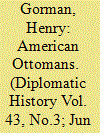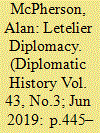|
|
|
Sort Order |
|
|
|
Items / Page
|
|
|
|
|
|
|
| Srl | Item |
| 1 |
ID:
165957


|
|
|
|
|
| Summary/Abstract |
This essay explores a complex, changing encounter between the Ottoman state and an influential community of American Congregationalist and Presbyterian missionaries who worked in Syria over the course of the nineteenth and early twentieth centuries.1 The missionaries’ own accounts present the history of their relationship with the world’s most powerful Islamic empire, where they lived and worked, as a saga of struggle and unmitigated hostility. In 1921, Charles Dana, a managerial missionary who took care of finances for the American Mission Press in Beirut, recapitulated decades of his colleagues’ anti-Ottoman rhetoric when he wrote that “The American Press has in its century of service been forced to fight its way up through countless discouraging reverses, through wars, massacres, pestilence, and famine, and the vicissitudes of the Turkish Empire. Its buildings and grounds have … been the only shelter for the thousands of refugees, fleeing from the fire and sword of the despotic Turk.”2 His phrases echo a century of American Protestant missionaries’ writings about their work under Ottoman rule.
|
|
|
|
|
|
|
|
|
|
|
|
|
|
|
|
| 2 |
ID:
165955


|
|
|
|
|
| Summary/Abstract |
On May 18, 1966, U.S. Secretary of Defense Robert S. McNamara delivered a speech to the American Society of Newspaper Editors in Montreal entitled “Security in the Contemporary World.” Building on remarks that he had made in front of the Senate Foreign Relations Committee (SFRC), the title was deceptively bland and belied its significance. McNamara, heretofore loyal to Johnson, was publicly breaking ranks with official administration policy on Vietnam. In the weeks prior, back in the Pentagon, McNamara had considered and authorized the Joint Chiefs of Staff’s (JCS) proposals, which National Security Advisor Walt W. Rostow had endorsed, to expand Operation Rolling Thunder, a gradual but sustained aerial bombardment campaign against North Vietnam. In Montreal, however, he described the “special satisfaction for a Secretary of Defense to cross the longest border in the world and realize that it is also the least armed border in the world.” He reflected on the “narrow” and “stereotyped terms” that framed discussions of national security, as well as the “eradicable tendency to think of our security problem as being exclusively a military problem.” In lieu of these “clichés,” he suggested that “security is development” and that poverty in the developing world was a greater challenge to international security than a Communist master plan.1
|
|
|
|
|
|
|
|
|
|
|
|
|
|
|
|
| 3 |
ID:
165951


|
|
|
|
|
| Summary/Abstract |
It is a privilege to have the opportunity to address you all today. I would like to start with a shout-out to Stuart L. Bernath. I have been a big fan of Bernath ever since I was hunting for a transatlantic Civil War dissertation topic back in grad school. It was then that I first came across Squall Across the Atlantic: American Civil War Prize Cases and Diplomacy, a meticulously researched and perceptive study of maritime law during the Civil War.1 Half way through reading it I concluded that I better look for a different way into my topic of choice, such was the quality of Bernath’s study.
|
|
|
|
|
|
|
|
|
|
|
|
|
|
|
|
| 4 |
ID:
165954


|
|
|
|
|
| Summary/Abstract |
From June until November of 1963, Iraq’s first Ba‘thist regime conducted a ruthless war of pacification against an insurrection of the Kurdistan Democratic Party (KDP) in the country’s mountainous north. The regime perpetrated large-scale human rights violations against Kurdish fighters and non-combatants, including summary executions, crop destruction, abuse of prisoners, and ethnic cleansing. The U.S. defense, intelligence, and diplomatic establishments during the presidential administration of John F. Kennedy were fully aware of the regime’s war crimes. Despite that fact, the administration transferred to the Iraqi government military equipment, parts, ammunition, and weapons that it required for the prosecution of its war. American officials displayed a remarkably uniform consensus of opinion about the utility of arming the Ba‘thist regime. Yet, the questions of what specific goals the United States could accomplish in supplying weapons and what weapons should be supplied divided policy makers in the Defense and State Departments, the Central Intelligence Agency (CIA), and the National Security Council (NSC). Their differences were sharpened because the Kennedy administration thoroughly enmeshed its global Cold War strategies with its economic strategies directed at the U.S. balance of payments deficit and because the administration institutionalized a partnership between the Pentagon and the American defense industry.
|
|
|
|
|
|
|
|
|
|
|
|
|
|
|
|
| 5 |
ID:
165953


|
|
|
|
|
| Summary/Abstract |
On September 21, 1976, a bomb taped to the bottom of the car of Chilean exile and former ambassador and minister Orlando Letelier exploded as he drove into Sheridan Circle in Washington, DC. The Chilean died within minutes. Ronni Moffitt, Letelier’s co-worker and a U.S. citizen, sat in the passenger’s seat and also died. Letelier had been an outspoken opponent of Chilean dictator Augusto Pinochet, whose military junta had overthrown Marxist president Salvador Allende in 1973 and thrown Letelier, then Minister of Defense, in a prison camp for a year without charges. The investigation that followed pointed to the National Intelligence Directorate (DINA), the Chilean secret police, as the culprit, helped by an American-Chilean and a handful of Cuban-Americans; criminal and civil cases to bring the guilty to justice swallowed up the next few decades.
|
|
|
|
|
|
|
|
|
|
|
|
|
|
|
|
| 6 |
ID:
165956


|
|
|
|
|
| Summary/Abstract |
In mid-May 1967 United Nations Secretary-General U Thant quickly acceded to Egyptian demands that he withdraw the United Nations Emergency Force (UNEF) from its positions on the border between Israel and the United Arab Republic (UAR), a border upon which it had stood since 1956. At a time of growing political tension in the region, the removal of UNEF left the two countries’ military forces facing each other directly. Three weeks later, when war broke out, Thant shouldered much of the blame in the West for having removed what many considered to have been a successful venture in UN peacekeeping and an indispensable barrier to the resumption of hostilities between two long-time combatants.
|
|
|
|
|
|
|
|
|
|
|
|
|
|
|
|
| 7 |
ID:
165952


|
|
|
|
|
|
|
|